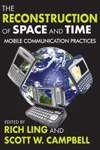Book: The Reconstruction of Space and Time: Mobile Communication Practices
By Rich Ling, Scott Campbell (editors)
Published by Transaction Publishers, 2008
ISBN 141280809X, 9781412808095
304 pages
Google preview
Summary
One of the most significant and obvious examples of how mobile communication influences our understanding of time and space is how we coordinate with one another. Mobile communication enables us to call specific individuals, not general places. Regardless of location, we are able to make contact with almost anyone, almost anywhere. This advancement has changed, and continues to change, human interaction. Now, instead of agreeing on a particular time well beforehand, we can iteratively work out the most convenient time and place to meet at the last possible moment—on the way to the meeting or once we arrive at the destination.
In their early days, mobile devices were primarily used for various types of emergency situations and for work. In some cases, the device was an essential element in various business operations or used so that overseas workers could communicate with their families. The distance between a remote posting and the people back home was suddenly and dramatically reduced. People began to share these devices not necessarily out of economic issues, but also questions of family and interpersonal dynamics.
The process of sharing decisions as to who is a legitimate partner makes the nature of relationships more explicit. By examining the economy of sharing, we not only see how sharing mobile phones restructures social space, but are also given insight into an individual’s web of interactions. This cutting-edge book deals with modern ways of thinking about communication and human interaction; it will illuminate the ways in which mobile communication alters our experience with space and time.
About the authors
Rich Ling is a sociologist at Telenor’s research institute near Oslo, Norway and has been Pohs visiting professor of communication at the University of Michigan, Ann Arbor. He is the author of New Tech, New Ties: How Mobile Communication is Reshaping Social Cohesion and The Mobile Connection: The Cell Phone’s Impact on Society.
Scott W. Campbell is assistant professor and Pohs fellow of telecommunications in the Department of Communication Studies at the University of Michigan. His research has been published in the journals Communication Education, Communication Monographs, International Journal of Communication, Journal of Applied Communication Research, New Media & Society, and others.
Table of Contents
Introduction: The reconstruction of space and time through mobile communication practices
by Rich Ling and Scott W. CampbellTailing untethered mobile users: Studying urban motilities and communication practices
by Dana Diminescu, Christian Licoppe, Zbigniew Smoreda and Cezary ZiemlickiMigrant workers and mobile phones: Technological, temporal, and spatial simultaneity
by Fernando ParagasPortable object in three global cities: the Personalization of urban places
by Mizuko Ito, Daisuke Okabe, and Ken AndersonNew reasons for mobile communication: Intensification of time-space geography in the mobile era
by Ilkka ArminenNonverbal cues in mobile phone text messages: The effects of chronemics and proxemics
by Nicola Doring and Sandra PoschlMobile phones: Transforming the everyday social communication practice of urban youth
by Eva Thuline and Bertil VilhelmsonMobile phones: Transforming the everyday social communication practice of urban youth
by Eva Thuline and Bertil VilhelmsonNegotiations in space: The impact if receiving phone calls on the move
by Ann LightMobile phone “workâ€: Disengaging and engaging mobile phone activities with concurrent activities
by Marc RelieuBeyond the personal and private: Modes of mobile phone sharing in urban India
by Molly Wright Steenson and Jonathan DonnerConclusion: Mobile communication in space and time—Furthering the theoretical dialogue
by Scott W. Campbell and Rich Ling
Chapter summary
Beyond the personal and private: Modes of mobile phone sharing in urban India
by Molly Wright Steenson and Jonathan Donner
This chapter contributes to the overall dialogue on the significance of mobile communication for human, social space by expanding the inquiry into one of the world’s largest communities of mobile users, India. In this context, we draw on ethnographic research to identify various modes of mobile phone sharing which cannot be entirely explained by economic necessity, and instead reflect deeper processes of human organization. In the process, the chapter further illustrates how mobile communication helps people create and alter the social spaces around them.
(via Jonathan Donner)




